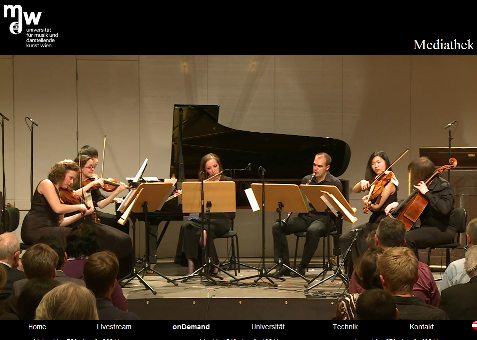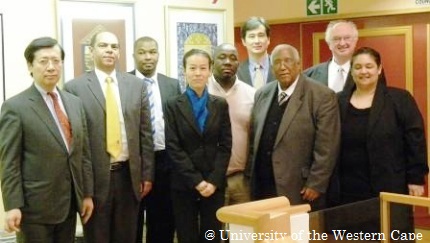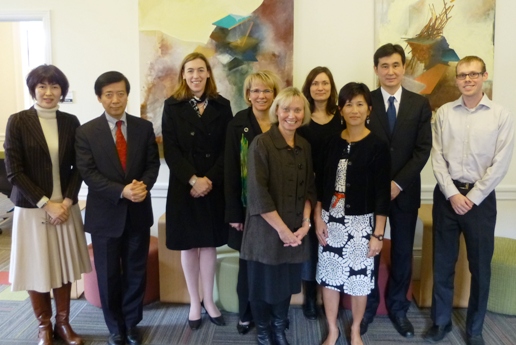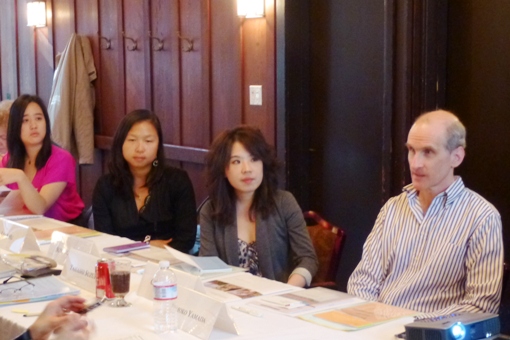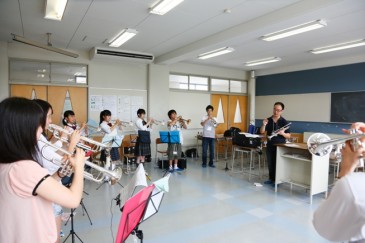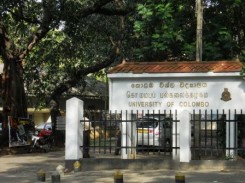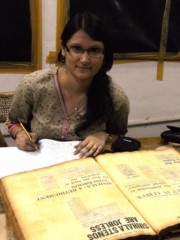Paulina Berrios, a doctoral candidate at the State University of New York, Albany, and a Sylff fellowship recipient at the University of Chile, shares the experiences of her field research (conducted with a Sylff Research Abroad award), during which she interviewed a number of part-time professors at Chilean universities to understand what they do inside and outside the classroom.
* * *
Qualitative Research as a Collaborative Enterprise:How I Learned from Other People’s Experience and Developed as an Interviewer
The research process is itself a learning process. You discover new facts, identify new relationships among variables, and realize the many implications that the focus of your study can have on reality. On the other hand, you also come to master research skills that will be long lasting. As a research project usually involves many people and often multiple institutions, you also have an opportunity to network, which is an important skill to develop over time. My experience researching abroad fits this learning process too.

Paulina at the library of the State University of New York, Albany.
Currently pursuing my PhD in educational administration and policy studies with a concentration in higher education at the State University of New York at Albany, I went to Chile—my native country—to collect data for my dissertation. This research project deals with the academic work of part-time professors at universities in Santiago, Chile, and how institutions treat, value, and regulate their academic work.
The purpose of my research abroad was to conduct in-depth interviews with both part-time professors and university administrators. Having to conduct at least 60 interviews taught me many lessons. Among the most important were that qualitative research is a collaborative enterprise and that the skill of interviewing develops during the research process.
Focus of My Research
The research for my dissertation pays special attention to what part-timers do inside and outside the classroom in Chile, a country where part-time professors have a predominant presence at both public and private institutions of higher education. In addition, my study asks the question: What is the academic work of part-time professors? Because this is conditioned by many variables, an exploration of the academic work of part-time professors needs to be seen through multiple perspectives. By bringing together sociological, historical, and organizational perspectives into the analysis of part-time professors, research can be conducted that will help elucidate how institutions, organizational arrangements, national contexts of higher education, and individual dimensions like gender and age condition the academic work of part-time professors.
Research Hypothesis
Researchers have found that US part-time professors engage mostly in teaching activities (NCES 2002; Kezar 2012) and that they teach an average of 1.6 undergraduate classes and 0.2 graduate courses (NCES, 2002). So, I started by assuming that even though the data is for the United States, the Chilean case will not be dramatically different. In other words, I hypothesized that teaching, and more specifically, undergraduate teaching, would represent the main chunk of the academic work of the part-time professors at sampled Chilean universities. However, given the literature on differentiation in higher education, I expected that patterns would vary by both system factors, such as academic discipline and professional field, and individual factors like gender and age.
Selection of Cases
Regarding the selection of institutions for the fieldwork, geographical location and range of academic programs were the two main criteria. As a result, nine academic programs at five universities were selected. Specifically, these five universities were of three different types: research universities (Universidad de Chile, Universidad de Santiago, and Pontificia Universidad Catolica), a selective, large private university (Universidad Nacional Andres Bello), and a nonselective, large private university (Universidad San Sebastian). The nine academic and professional programs selected were mathematics, chemistry, sociology, history, education, engineering, nursing, odontology, and architecture.

Andrés Bello National University
Preliminary Findings
As for the major findings, to a certain degree, the academic work of part-time professors in Chilean universities matched the literature on this topic worldwide: Generally, part-time professors focused on teaching, but the teaching was executed differently, depending on the academic or professional program. Their work was also treated very differently by the various academic departments and schools. One manifestation of this differential treatment was the salaries offered to part-time professors; another was the institutional mechanisms introduced as incentives to retain part-time professors.
My research at Chilean universities revealed that some academic departments and professional schools were highly dependent on their part-time professors. Although their employment was not secured, part-time professors at these universities were offered very good salaries and incentives for their teaching services. As this study was not intended to be representative of the Chilean higher education system as a whole, these findings pertain only to the types of institution that were selected for this study, namely, public research universities and both elite and serious private universities.
The Researcher and the Fieldwork
In a qualitative study such as mine, collaboration proved to be critical. This is not to say that other types of research (e.g., quantitative) do not engage in collaboration, but in my case I could not have achieved all I did in the field without having both institutional support and good advice from relevant actors.
Good Advice Makes a Difference
Reality is not always what you expect. When engaged in the field, I found that what I learned about my research topic—that part-time professors are invisible to many—had a practical manifestation: When trying to contact part-time professors for interviews, I realized that they were hard to reach, since their contact information was not easily available. Information for full-time professors could be found by just navigating a university’s or department’s website, but this was not always the case for part-time professors. While I had some initial success in making connections with part-time professors, I realized that I would not reach my goal if I continued trying to contact them on my own.
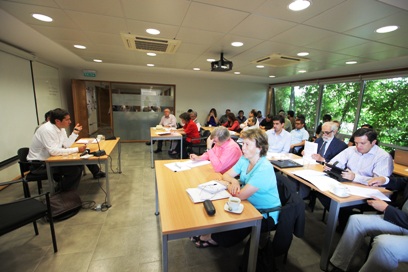
Paulina attended a higher education seminar at the Center for Research on Educational Policy and Practice
So I asked a Chilean professor, who is a member of my dissertation committee, for advice. He suggested that in order to deal with the logistics issue, I should change my strategy and consider a top-down approach. I thus decided to establish contacts first with department chairs and deans at the selected universities and academic programs to not only learn how institutions manage, evaluate, and monitor the academic work of part-time professors but also obtain a list of potential interviewees. This turned out to be very good advice, as I was able to interview department chairs and deans for my study and, at the same time, gain their trust. This also enabled me to receive additional information, such as institutional documents that facilitated access to additional participants. The good advice made a big difference, turning potentially discouraging and unsuccessful fieldwork into a very positive experience. In the end, I was able to conduct not 60 but 70 interviews!
Support Is Critical
Carrying out qualitative research is costly in terms of time and economic resources. As the process of collecting data is time consuming, and in my case, I had to travel to another country in which meant I had to invest significant resources and get support from others. Thanks to the Tokyo foundation’s SRA program that provides support for academic research related to doctoral dissertation in a foreign country, I was able to plan a 13-weeks stay to conduct my fieldwork in Chile.
However, after engaging in my fieldwork, it became obvious that the original allotted time of 13 weeks was too ambitious, which led me to extend my time in the field to 35 weeks. Because of this unexpected turn, I had to talk with the many people who were supporting my research and get from them not only their consent but also their support to keep moving forward in my research despite the hardships encountered along the way. Fortunately, at the end of the process, I was able to achieve successfully my field work’s goals thanks to the institutional support given by the SRA program, my sponsor and fieldwork supervisor –Dr. Rosa Deves- at Universidad de Chile, my committee member professor –Dr. Andres Bernasconi- at Pontificia Universidad Catolica, my institutional liaison at Universidad San Sebastian –Vicerector Gonzalo Puentes-, and my academic advisor –Dr. Daniel Levy- from the State University of New York at Albany.
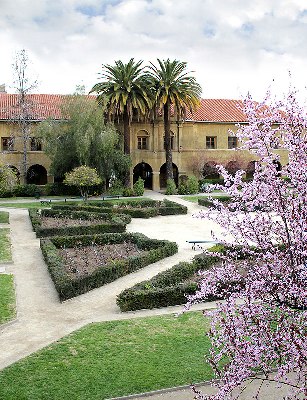
San Sebastian University
The Interviewing Experience
Learning from others can be a priceless and unforgettable experience. As I traveled far to explore what Chilean part-time professors do inside and outside the university classroom, I gained a deeper understanding of what these professors do and what motivates them to work part-time in higher education. And while interviewing university administrators, it became clear why they were employing these part-time professors and how much they relied on them. In some cases, part-time professors were regarded with such high esteem that I wondered if this was the case in other countries as well.
My research also helped me to master the skill of interviewing. Can you imagine trying to interview someone who does not know anything about you but just the topic of your research? Even more, how would it feel when your interviewee sits down in front of his or her computer and does not pay any attention to you? It can be very hard to get started indeed! During my first interviews, it was difficult to deal with people I did not know, not to mention how nervous I was! But as I kept interviewing, I learned how to grab the attention of the interviewee from the outset and, more importantly, how to gain their trust about the seriousness of my research.
People are often very busy, and they want to know immediately how they were chosen for the interview; sometimes it is hard to break the ice. So, in some ways an interview is a performance from the very first moment you greet your interviewee to the minute you end the conversation. Moreover, the performance needs to be executed in a transparent manner so that you gain the trust of your interviewee and makes him or her willing to collaborate with your research and respond with valuable information to your questions. People are curious about you, so sometimes you have to talk about yourself as well. It is a two-way exchange, and as an interviewer you have to be open to the needs of the participants too.
Finally, the fieldwork evolved from being almost impossible to achieve and highly exhausting to execute (interviewing 70 people meant I had to contact many more people!) to a completely satisfying endeavor with a strong sense of accomplishment. Without doubt, it was an experience that I would recommend to anyone planning to conduct qualitative research. If you are one of them, good luck with your future endeavors! As for me, I now have to start writing and analyzing all the rich data I have managed to collect in the field.

